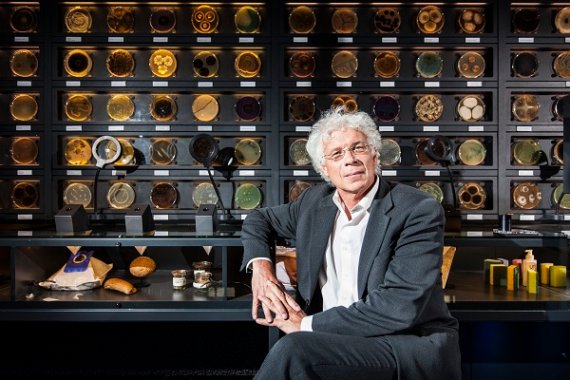<Willem de Vos, photo by Bram Belloni>
De Vos and his team had already studied the effect of sterilisation on the functioning of the intestinal bacterium. However, sterilised Akkermansia bacteria appeared not to protect mice from obesity and diabetes. ‘That is why I wondered what consequences pasteurisation would have’, says De Vos. Pasteurisation is a gentler heating process in which bacteria are killed, but certain proteins remain intact.
Fat
Interestingly enough, the Akkermansia cells that were killed using the pasteurisation process caused a slower weight gain and a higher sensitivity to insulin in mice on a high-fat diet. The dead cells even had a stronger effect than the live ones. This was a pleasant surprise for the researchers. ‘Because this means that the product can be put on the market relatively quickly’, says De Vos. After all, the microbial culture is already conserved and the legal approval is much easier than for living cells. Additionally, pasteurised Akkermansia cells are easier to handle and package than the extremely oxygen-sensitive living bacteria.
The search for an explanation of the effect of the dead bacteria cells led the researchers toward a protein on the outer membrane of Akkermansia: Amuc_1100. The ingestion of this protein also caused mice on a high-fat diet to remain slimmer. According to De Vos, the Amuc_1100 protein is unique to Akkermansia and ensures the communication with the human intestinal cells.
Medicine
While in the case of Akkermansia the professor mainly thinks of use as a dietary supplement, for example in weight loss drinks, he sees the Amuc_1100 protein as a likely candidate for medicinal use. ‘It could, for example, accelerate existing therapies for people with inflammatory bowel diseases, such as Crohn’s disease, or with irritable bowel syndrome.
The safety of Akkermansia in humans has already been proven. And the research partner of De Vos, professor Patrice Cani of the Université Catholique de Louvain-la-Neuve, is currently setting up a clinical study. ‘In this study, we will look at people with metabolic syndrome and lowered insulin sensitivity.’ De Vos expects the results of the study by the end of next year. He also wants to perform clinical studies with other patient groups, such as people with chronic intestinal inflammations.
Gate keeper
It is not surprising that Akkermansia muciniphila can combat intestinal inflammations (that also occur in obesity and type 2 diabetes). The intestinal organism – which was isolated for the first time in 2004 by Muriel Derrien, one of De Vos’ PhD candidates – lives in the intestinal mucous membrane and protects the intestinal wall against leakage. ‘We partially feed the bacteria ourselves with our mucus, or intestinal mucosa’, says De Vos. ‘And Akkermansia does something for us in return. I sometimes call it the gate keeper of our barrier layer.’
To scale up the production of Akkermansia and the membrane protein, De Vos has started the spin-off A-Mansia Biotech together with Wageningen University and the Université Catholique de Louvain-la-Neuve. ‘Because I learned that starting your own company is the best way to ensure that something happens with your knowledge.’

